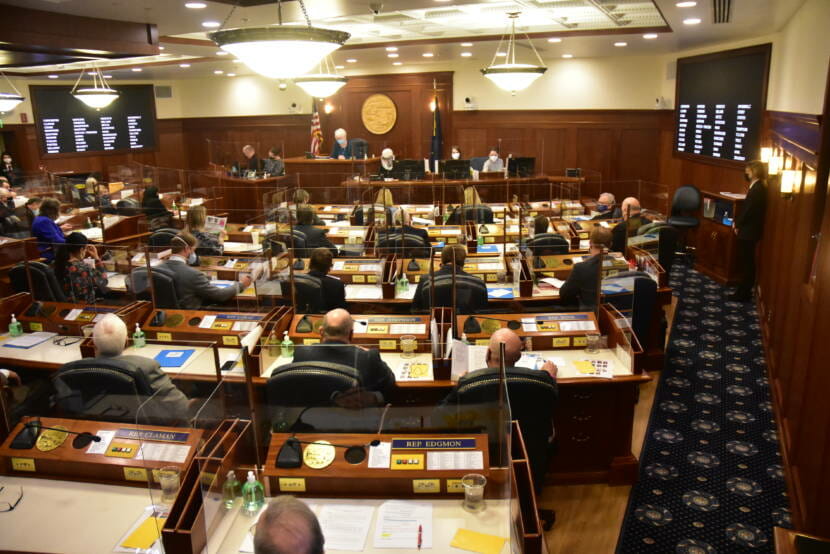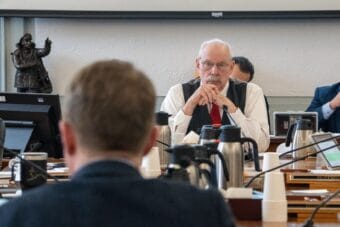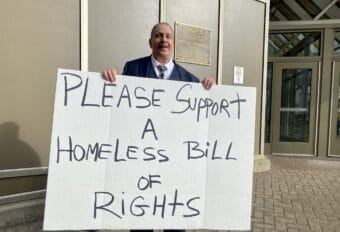
Alaska lawmakers’ regular session ended Wednesday, but they have a lot of work left to do on the state budget, and they still need to finalize the size of this year’s Permanent Fund dividend.
Under a version of the state budget approved by the Senate Wednesday, Alaskans would get PFD checks of about $2,300. But not everyone agrees on that amount. Critics say it’s way too much money to draw from the fund’s earnings reserve.
A 30-day special session to address these issues is scheduled to start at 10 a.m. Thursday.
‘People’s lives we’re talking about’
Sen. Shelley Hughes (R-Palmer) voted for an amendment Wednesday for $2,300 PFDs.
The dividend benefits every Alaskan, she said, and she wants it added to the state constitution, ensuring it’s paid before other state expenses.
“Then we could settle this once and for all, and we will know what we need in order to pay for government, once we take the first call for the PFD,” said Hughes.
Sen. Mike Shower (R-Wasilla) said a $2,300 PFD is a step in the right direction, and lawmakers should look beyond the numbers.
“How do you balance the budget?” he said. “Well, there’s more than that. There’s people’s lives that we’re talking about. And their ability to survive and thrive and have a good quality of life.”
But a $2,300 dividend would require drawing $1.5 billion more than planned from the Permanent Fund’s earnings reserve.
‘Sick and tired of kicking the can down the road’
Sen. Lyman Hoffman (D-Bethel) voted no on the amendment, as well as on another amendment that would have paid dividends of more than $3,000. He said he supports larger dividends, but paying them when the budget isn’t balanced will put off resolving the issue.
“So today, I’m a big supporter of the dividend,” Hoffman said. “I’m a big supporter of trying to resolve the problem. And I’m sick and tired of kicking the can down the road.”
Sen. Bert Stedman (R-Sitka) warned against drawing down the earnings reserve. He said paying a smaller dividend of $1,000 this year would allow the Permanent Fund to grow to benefit future generations.
“They’ll have very nice, handsome dividends, our grandchildren,” Stedman said. “I don’t want them to look back in the history books of my ancestors that helped, you know, lived in Alaska at the time they put it together. And me liquidating it.”
More work to do in special session
Gov. Mike Dunleavy has put two items on the agenda of the special session that starts Thursday: finishing work on the budget and consideration of a constitutional amendment that would enshrine the PFD in the constitution.
Lawmakers have been deeply divided for six years over how to pay for dividends and how high PFDs should be.
Sen. Bill Wielechowski (D-Anchorage) said the budget problem is due to low oil taxes. He described the state government’s message to industry:
“Go ahead, take the resources — don’t have to compensate us. Pay the lowest taxes in the world. And instead we’re going to take it from the people. And that is unfair. The people need to understand that,” Wielechowski said. “They need to know that this is a tax on them. This is unfair.”
Shower said a statewide sales tax could contribute to closing the budget gap.
But Natasha von Imhof (R-Anchorage) said it doesn’t make sense to tax one group of Alaskans to pay for larger dividends.
“I cannot be the senator that taxes hard-working Alaskans and takes money from their paycheck only to deposit it in the personal checking account of their neighbor,” she said.
Other Senate amendments would provide $13 million for a trail from Fairbanks to Seward and allow COVID-19 business grants to pay for pandemic recovery costs. But the Senate rejected adding language similar to the House bill intended to block state Medicaid funding for abortions. The Alaska Supreme Court has ruled that similar laws unconstitutionally singled out the procedure.
Since the House and Senate didn’t agree on each other’s versions of the budget, there will be a committee with three members from each chamber that will work out the differences between the two chambers. It could set the PFD at a smaller level than the Senate.
The Senate members will be Click Bishop (R-Fairbanks), Donny Olson (D-Golovin) and Stedman. The House members will be Neal Foster (D-Nome), Kelly Merrick (R-Anchorage) and Steve Thompson (R-Fairbanks).
Flurry of bills approved at last minute
In addition to the work on the budget, lawmakers ended the session with a flurry of other activity.
Fifteen bills will head to Gov. Mike Dunleavy’s desk for him to sign or veto.
They include a bill that allows people to share ownership of a dairy producing animal and pay another owner for raw milk or other dairy products made from raw milk. It would remain illegal to sell raw milk to those who don’t share ownership.
Another bill would expand the rights of people who live in assisted-living homes. Providers will be required to allow visitors. Residents would have a right to internet access and to meals consistent with their cultural preferences.
Work on bills that only passed one chamber will resume during the next regular session in January.



